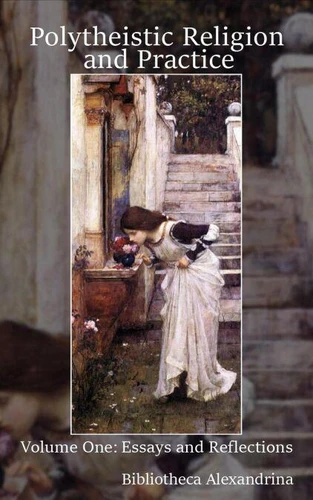Polytheistic Religion and Practice Volume One: Essays and Reflections
Par : , , , ,Formats :
Disponible dans votre compte client Decitre ou Furet du Nord dès validation de votre commande. Le format ePub est :
- Compatible avec une lecture sur My Vivlio (smartphone, tablette, ordinateur)
- Compatible avec une lecture sur liseuses Vivlio
- Pour les liseuses autres que Vivlio, vous devez utiliser le logiciel Adobe Digital Edition. Non compatible avec la lecture sur les liseuses Kindle, Remarkable et Sony
 , qui est-ce ?
, qui est-ce ?Notre partenaire de plateforme de lecture numérique où vous retrouverez l'ensemble de vos ebooks gratuitement
Pour en savoir plus sur nos ebooks, consultez notre aide en ligne ici
- FormatePub
- ISBN8201987183
- EAN9798201987183
- Date de parution03/11/2021
- Protection num.pas de protection
- Infos supplémentairesepub
- ÉditeurJL
Résumé
Polytheism: from the Greek poly for "many" and theos for "god." While the term itself may be simple enough to define, the traditions, beliefs, and practices that fall under it are complex and diverse. Contemporary Reclaiming Witchcraft, early Medieval Heathenry, the native practices of the Aztecs, Shintoism and Taoism, and present-day Hellenismos - to name just a few - all fall under the wide umbrella of polytheism.
Yet they are often radically different in their cosmologies, mythologies, ethics, eschatology, sacred rites, and other practices. These four essays exemplify that diversity of beliefs and practices. In "The Dawning of the Equinox, " Katie Collins delves into the history and theology behind one of the most important rites in Thelema; Reverend Amber Doty examines "The Nature of Evil" in a number of ancient mythologies, and how that influences modern practitioners of those traditions; in "Soul, Felt Experience, and Divinity, " Tom Cabot discusses the visible and invisible realms of Nature and the striving of the human soul towards the divine; and Nicholas Mennona Marino delves into the orations of Isocrates in "'Venerate What Relates to the Gods.'" These essays are only a beginning, though.
The complexity of polytheism cannot be contained in a single text. We hope that you will find these essays illuminating and thought-provoking - and that they will inspire you to make inquiries of your own into the nature of the Gods, humanity, and our collective relationships with one another.
Yet they are often radically different in their cosmologies, mythologies, ethics, eschatology, sacred rites, and other practices. These four essays exemplify that diversity of beliefs and practices. In "The Dawning of the Equinox, " Katie Collins delves into the history and theology behind one of the most important rites in Thelema; Reverend Amber Doty examines "The Nature of Evil" in a number of ancient mythologies, and how that influences modern practitioners of those traditions; in "Soul, Felt Experience, and Divinity, " Tom Cabot discusses the visible and invisible realms of Nature and the striving of the human soul towards the divine; and Nicholas Mennona Marino delves into the orations of Isocrates in "'Venerate What Relates to the Gods.'" These essays are only a beginning, though.
The complexity of polytheism cannot be contained in a single text. We hope that you will find these essays illuminating and thought-provoking - and that they will inspire you to make inquiries of your own into the nature of the Gods, humanity, and our collective relationships with one another.
Polytheism: from the Greek poly for "many" and theos for "god." While the term itself may be simple enough to define, the traditions, beliefs, and practices that fall under it are complex and diverse. Contemporary Reclaiming Witchcraft, early Medieval Heathenry, the native practices of the Aztecs, Shintoism and Taoism, and present-day Hellenismos - to name just a few - all fall under the wide umbrella of polytheism.
Yet they are often radically different in their cosmologies, mythologies, ethics, eschatology, sacred rites, and other practices. These four essays exemplify that diversity of beliefs and practices. In "The Dawning of the Equinox, " Katie Collins delves into the history and theology behind one of the most important rites in Thelema; Reverend Amber Doty examines "The Nature of Evil" in a number of ancient mythologies, and how that influences modern practitioners of those traditions; in "Soul, Felt Experience, and Divinity, " Tom Cabot discusses the visible and invisible realms of Nature and the striving of the human soul towards the divine; and Nicholas Mennona Marino delves into the orations of Isocrates in "'Venerate What Relates to the Gods.'" These essays are only a beginning, though.
The complexity of polytheism cannot be contained in a single text. We hope that you will find these essays illuminating and thought-provoking - and that they will inspire you to make inquiries of your own into the nature of the Gods, humanity, and our collective relationships with one another.
Yet they are often radically different in their cosmologies, mythologies, ethics, eschatology, sacred rites, and other practices. These four essays exemplify that diversity of beliefs and practices. In "The Dawning of the Equinox, " Katie Collins delves into the history and theology behind one of the most important rites in Thelema; Reverend Amber Doty examines "The Nature of Evil" in a number of ancient mythologies, and how that influences modern practitioners of those traditions; in "Soul, Felt Experience, and Divinity, " Tom Cabot discusses the visible and invisible realms of Nature and the striving of the human soul towards the divine; and Nicholas Mennona Marino delves into the orations of Isocrates in "'Venerate What Relates to the Gods.'" These essays are only a beginning, though.
The complexity of polytheism cannot be contained in a single text. We hope that you will find these essays illuminating and thought-provoking - and that they will inspire you to make inquiries of your own into the nature of the Gods, humanity, and our collective relationships with one another.



